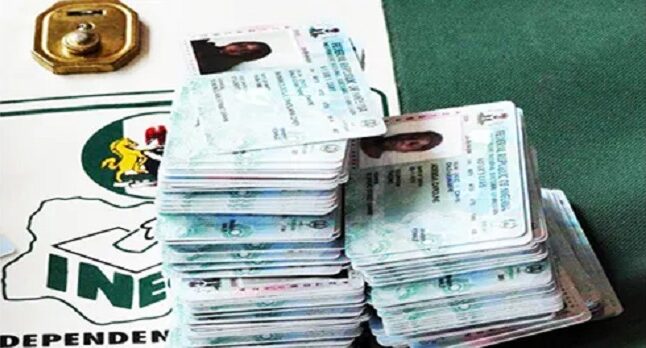By Nick Dazang
The price of liberty, the time-honoured saying goes, is eternal vigilance. Recently, the Coalition of United Political Parties (CUPP) demonstrated uncommon vigilance, steeped in patriotism, when it shrilly called the attention of Nigerians to strenuous efforts by unscrupulous persons to undo our Register of Voters. The CUPP also alleged, among others, that a grand design to remove the INEC Chairman, Professor Mahmood Yakubu, and to supplant him with a pliant person was afoot.
Given the many concerns raised by Nigerians on the Register of Voters, today’s discourse seeks to address the storied pedigree of the Register, its crucial place in delivering credible elections and the processes involved in putting in place a Register invested with integrity.
- 4 Nigerian, Niger Republic govs meet in Katsina over insecurity
- NIGERIA DAILY: What You Should Know About National Grid Collapse
After the conduct of the 1999 and 2003 General Elections, it became crystal clear that the manual register, as it then was, was defective, susceptible to padding and therefore could be deployed wantonly to rig elections. To staunch this possibility, of the register being used to undermine elections, the Independent National Electoral Commission (INEC) under the watch of Dr. Abel Guobadia, 2002, found recourse in the Optical Mark Recognition (OMR) forms plus still cameras to register eligible voters. This marked the Commission’s foray into technology to address electoral challenges.
The OMR was soon upgraded by Professor Maurice Iwu, who introduced the Electronic Voting System (EVS). The gamut of the EVS encompasses Electronic Registration and Electronic Balloting, known also as the Electronic Voting Machine (EVM). Between 2006-2008, the Commission did pilots of Electronic Registration using the Direct Data Capture Machines (DDCMs). The DDCM is made up of a laptop and other accessories such as scanners and cameras used to capture the biometrics of prospective voters. Due to the limited number of DDCMs deployed for the pilots, the electronic voter registration began by Professor Iwu did not gain the requisite traction or success.
The previous year, Professor Attahiru Jega was appointed the INEC Chairman. The Commission, under his leadership, realised that for it to deliver credible elections and imbue the process with transparency, it must put in place a trusted register. Cognisant of this, it made a compelling case before the Executive and Legislative branches for a registration exercise in which at least one DDCM was to be deployed to the then 120,000 Polling Units. This request, galvanised by a huge clamour for transparent elections by Nigerians and members of the international community, was granted pronto by the government. This approval paved way for one of the largest and most elaborate voter registration exercises in the world.
Elaborate and unprecedented exercises come with their hiccups. The voter registration under Professor Jega’s watch was not an exception. At the initial stages of the exercise, the DDCMs failed to capture the fingerprints of eligible voters as planned. Some cameras had challenges with capturing the facials. Immediate patchings and adjustments were effected.
As if these were not bad enough, in spite of sustained and elaborate publicity and voter education, many Nigerians, in contradiction to the law, registered more than once. When the Automated Finger Identification System (AFIS) software was deployed to check multiple registrations it turned out, sadly, that millions of Nigerians, some out of ignorance, some out to game the exercise, did multiple registrations. And this occurred across all the states of the federation and the Federal Capital Territory (FCT).
Fast forward to 2017. Whereas the repealed Electoral Act 2010 (as amended) and the re-enacted Electoral Act 2022 in Sections 9 and 10 command in unmistakable terms that “there shall be Continuous Voter Registration….”, most Commissions had observed or carried out this injunction in the breach, either due to paucity of resources or lack of will. Enter Professor Yakubu as INEC Chairman. For the first time in our electoral annals, the Commission conducted voter registration on a continuous basis from Thursday, 27th April 2017 until a few months to the conduct of the 2019 General Elections. By the same token, another CVR exercise under his watch began on June 28, 2021, and was suspended on July 31, 2022. Also, for the first time, on the African continent, Nigerians began the exercise online and consummated it in person or physically at designated centres.
Four salient issues stand out. The CVR exercise cannot continue interminably and into the conduct of the elections. The Commission needs to take time to clean up the register of multiple registrants and if possible prosecute such willful offenders. It has to print the Permanent Voter Cards (PVCs) arising from the registration exercise. And it has to publish and present a clean Register to political parties and other critical stakeholders ahead of the 2023 general elections.
Secondly, as with the experience of 2011, mischievous and desperate persons will attempt to register more than once or strain themselves to undermine the Register. What is key is that the Commission, through the Automated Biometric Identification System (ABIS) software should scrutinise, detect and remove multiple registrations from the Register of Voters.
All a registered voter needs to do to confirm his status(for those registered before 2019) is to visit its website:www.inecnigeria.org and to use the verified link: voters.inecnigeria.org.
Nick Dazang is a former Director at the Independent National Electoral Commission (INEC).




